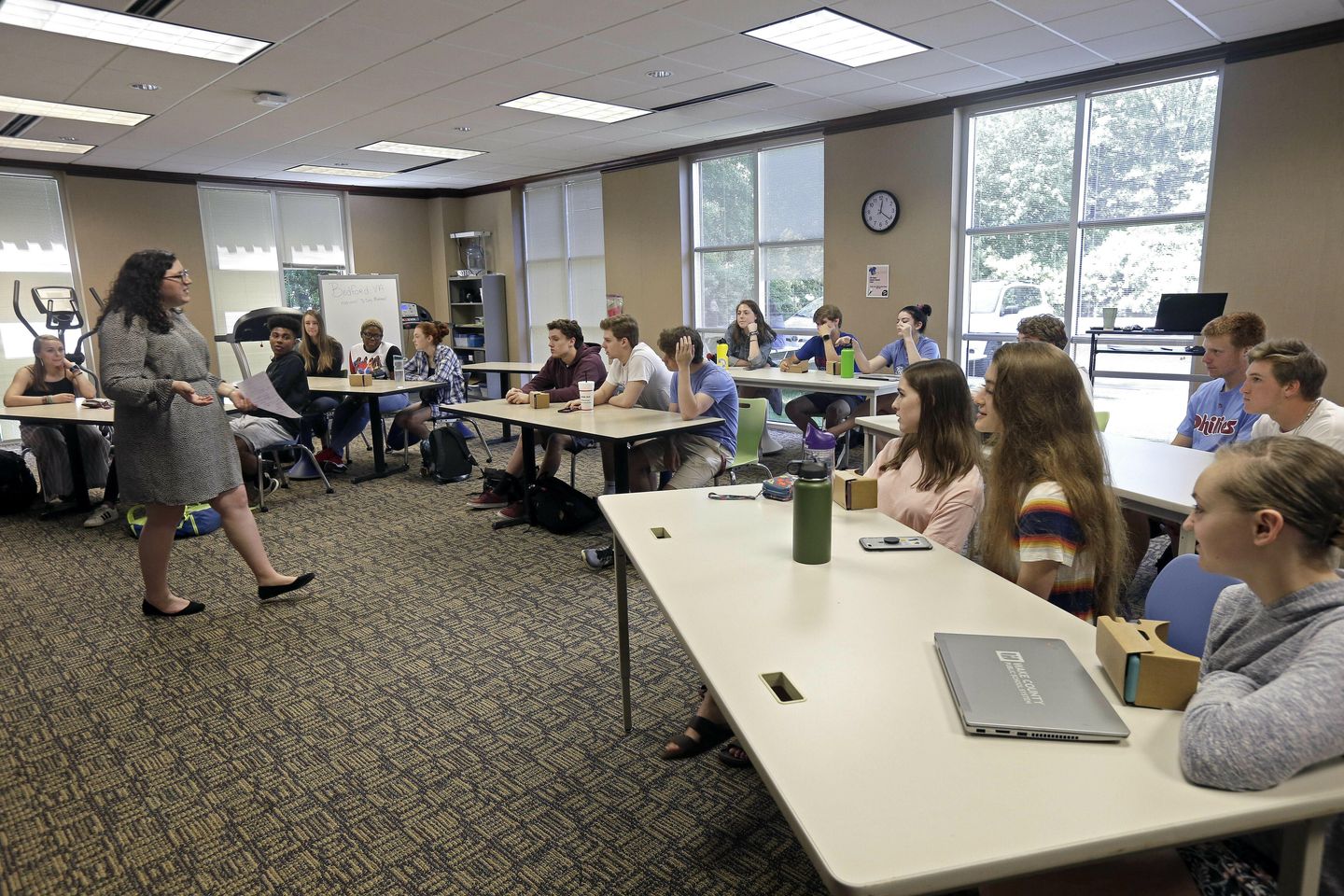
Most Advanced Placement exams will go digital next month as 28 out of 36 subjects no longer require paper and pencil, the College Board said Thursday.
The nonprofit testing company said high school students will take their May 5-16 end-of-course AP exams in 16 subjects — including English, psychology and computer science — entirely through its Bluebook software program on personal or school-supplied devices.
An additional 12 subjects requiring graphic or symbolic notation, including calculus and chemistry, will offer hybrid testing with digital multiple-choice questions and paper for free-response questions. The remaining eight all-paper exams are in languages, music theory, research and art design.
“We’ve found that almost all students who’ve taken a digital AP exam or participated in an AP digital testing pilot have adapted quickly to the new format,” said Trevor Packer, head of the AP Program. “Students today are digital natives and appreciate the user-friendly features of the Bluebook interface.”
High school students who take AP courses earn weighted marks that improve their grade-point average and can test out of required first-year college courses by passing the AP Exam.
The College Board said over 3 million students will take nearly 6 million “fully digital or hybrid digital” AP examinations this year as the culmination of a years-long transition to online testing. The number of AP Exam takers has risen steadily from 1.2 million in 2000.
Reached for comment, many education insiders predicted digital testing would make exams more popular and speed up grading. At the same time, they questioned the College Board’s motives, with some flagging a dumbing-down of standards in recent years.
“Overall, I think this is a positive development,” said Shaan Patel, CEO of Prep Expert, a Las Vegas-based company that offers private tutoring for AP exams. “Still, the College Board is a business, and it’s fair to question whether changes are driven more by pedagogy or profitability.”
In recent years, the College Board has relaxed its grading system and added trendy courses to the AP Exam catalog as birth rates decline and fewer students pursue college.
Recent additions include AP African-American studies, which became available throughout U.S. high schools for the first time in the fall.
“The College Board’s decision to move most AP exams to a digital format raises the disturbing possibility that these exams will be further watered down,” said Timothy K. Minella, a senior fellow at the conservative Goldwater Institute.
He pointed to “strong evidence” that the SAT, a college entrance exam, has become “significantly easier” since the College Board switched it to a digital-only format in 2024.
“For example, the digital SAT tests students on their comprehension of very short reading passages, instead of longer, more challenging texts,” Mr. Minella said.
In July 2024, the College Board revealed that it started scoring the AP Exam differently in 2022 to bring up all of its subjects to pass rates between 60% and 80%. It cited a need to better reflect the letter grade distribution in AP high school classes nationwide, as tracked by digital software adopted in 2019.
The share of students earning a passing score jumped in the years that each subject adopted the new system. Pass rates increased for AP English Literature by 30 percentage points to 77.9% in 2022, for AP Chemistry by 21 points to 75.1% in 2023 and for AP U.S. History by 16.7 points to 72% in 2024.
The College Board denied any financial motive for the change.
But Gary Stocker, a former university administrator who founded College Viability to evaluate campuses’ financial sustainability, said the board “will always look to drive additional net revenue.”
“Ease of use will almost certainly increase the number of test takers,” Mr. Stocker said. “That will impact the admissions numbers at selective colleges. However, it is too early to estimate what that impact will be.”
Big money
At $97 per exam, the AP system generated about $500 million in revenue for the College Board in 2022, or half of its $1.04 billion budget.
The board has scored AP exams on a 1-5 scale for high school students since 1954. Universities accept no less than a “qualified” score of 3 for students to test out of 38 introductory classes in languages, social studies, arts, mathematics and science.
“The College Board is mainly a marketing operation that is always looking to expand the population that takes its exam,” said Peter Wood, president of the conservative National Association of Scholars. “But I doubt [going digital] has much bearing on the quality of the tests or the integrity of the results. Those have already been compromised in so many ways that it would be foolish to put much stock in them.”
The College Board has piloted digital AP exams in select subjects since 2022. On Thursday, it said 650,000 AP exams in 2024 were digital, with more than 75% of students and administrators “rating the digital testing experience better or the same as paper testing.”
The board has also developed free online practice exams, quizzes and test preparation resources.
John Moscatiello, a New Jersey high school teacher and guidance counselor who tutors students in test preparation, said most teachers and students prefer digital testing. But he pointed to technical glitches in the AP Classroom test prep platform this month as a reason for caution.
“AP teachers and students lost thousands of instructional hours due to these technical problems with AP Classroom,” he said. “Even minor problems in Bluebook on this year’s exams could cause disruptions for thousands of students and raise even more doubts about the College Board’s ability to deliver on its ambitious tech agenda.”
Nevertheless, many analysts called the change long overdue.
“The real question for the College Board is, what took you so long?” said Michael J. Petrilli, president of the Thomas B. Fordham Institute, a right-leaning education think tank. “Moving to digital assessments makes perfect sense.”












